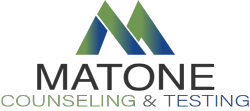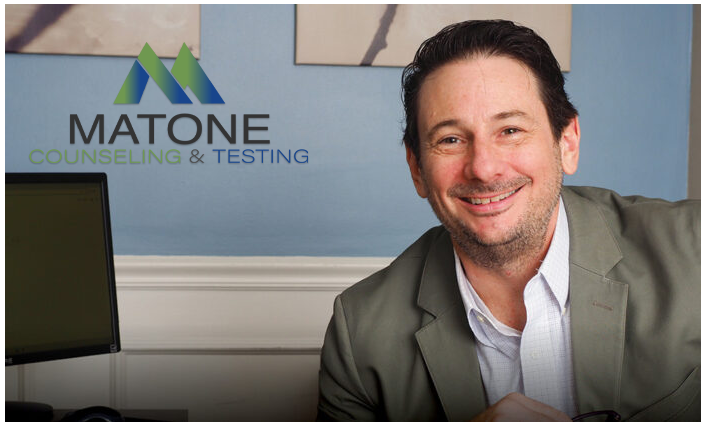Matt & Kim Matone are in the news!
Read the full story here: Counseling practices thrives as mental health concerns mount – Business NC
Recent story by Vanessa Infanzon – Business North Carolina
![]()
Transcript:
In 2015, after 19 years with Bank of America, Matt Matone received a buyout offer when his Charlotte-based job as a senior vice president in a small business sales division was moved to another state. It had been his dream job, managing call centers in Los Angeles and Tampa, Florida.
Within 90 days of leaving the bank, Matt and his wife, Kim, opened a franchise counseling practice with Thriveworks, a mental healthcare provider with offices in 49 states, including 15 locations in North Carolina. Five years later, the Matones formed their company, Matone Counseling & Testing, an independent practice that now has a combined four offices in Asheville and Charlotte.
The couple had looked at franchise opportunities with hair salons and gyms, but a counseling center resonated with them. Both have relied on mental healthcare for decades. Indeed, their family and lives had been saved by mental health professionals, Matt says.
The couple met as 10th-graders at East Mecklenburg High School in Charlotte. Both ran cross country and track and took several classes together. It took Kim two years before saying yes to a date with Matt. They married in 1993 and have two children, Jessica, 24 and Luke, 21.
Before graduating from high school, Kim was hospitalized and diagnosed with bipolar disorder. Matt battled substance abuse until 2012, when he entered a four-month outpatient program at the Dilworth Center, an addiction and mental health facility in Charlotte. “Mental health services were absolutely necessary for every member of the family,” he says. “Our family was torn apart. To mend it back together, we leaned on professionals.”
With his business background and Kim’s master’s degree in mental health counseling from Montreat College, the career shift has proved to be wise.
“[We wanted to] open something in the community we live in that accepts insurance, that has clinicians that see clients at night, that’s open on Saturdays,” Matt says. “Accessibility to mental health in the neighborhood we grew up in was very important to us and has informed a lot of what we do.”
According to a KFF study, about 25% of adults in North Carolina reported symptoms of anxiety and/or depression in 2023. The same report says about 60% of N.C. adults with a mental illness had private insurance, while 16% had Medicaid, as of 2018. The National Alliance on Mental Health’s Fact Sheet asserts that more than 2.5 million North Carolina residents live in a community with too few mental health professionals.
GROUP PRIVATE PRACTICE
An initial $81,000 investment gave them access to billing and other administrative services provided by Lynchburg, Virginia-based Thriveworks. After five years, the Matones negotiated an end to their contract, giving up the phone number and website, while retaining clients and staff and changing the business name. “When our contract was up, we operated independently, which was the greatest thing that ever happened to us,”
Matt says.
Kim, a licensed counselor, sees clients and is the chief culture officer. The full-time staff includes three clinical directors and 12 billing and scheduling employees. Fifty-two clinicians are independent contractors, who set their own hours and rates for clients who do not use insurance. Rapid growth in Asheville and Charlotte has bolstered the business, Matt says, declining to disclose annual revenue.
Blair Hamel succeeded Matt as CEO in December after serving as chief clinical officer. Matt is now the chief financial officer. “I’m trying to scale back and disengage from the day-to-day, non-financial issues,” he says.
Counseling services comprise 75% of revenue, while testing for ADHD, autism, learning disabilities and other psychological assessments make up the balance. Last year, the company brought in 2,900 new clients, administered 789 psychological tests and logged almost 36,000 clinical hours in virtual and in-person sessions. The office fields about 300 inbound calls a week, scheduling 70 to 80 new clients. “Really, it’s the secret to our growth,” he says. “I can’t guarantee we will answer the phone every time, but you will get a call back.”
Before the pandemic, 2% of Matone Counseling’s business was telehealth. Now, it’s 40%. Matt expects that number to stick because of the decreasing stigma, especially among younger generations, associated with getting help from a mental health professional.
Still, Matt worries that insurance companies could change the industry by limiting the number of sessions or reducing rates for telehealth. Reimbursement typically ranges from $95 to $145 per session. “We hear little whispers of [insurance payors] making telehealth more difficult or paying less for a telehealth session than they do for an in-person session, even though they are the
same thing.”
Dr. Jakub Mieszczak, a pediatric endocrinologist with Atrium Health, screens his patients for mental health issues because children with chronic illness are more likely to have those concerns, he says. He refers patients to many mental healthcare providers, noting that he’s had good feedback from clients of Matone Counseling.
“Matt understands people who are struggling or people who don’t have resources,” he says. “And that’s a wonderful thing for Charlotte to have the Matones here.”




